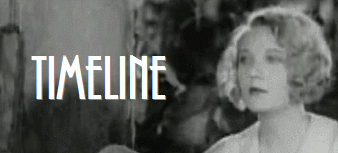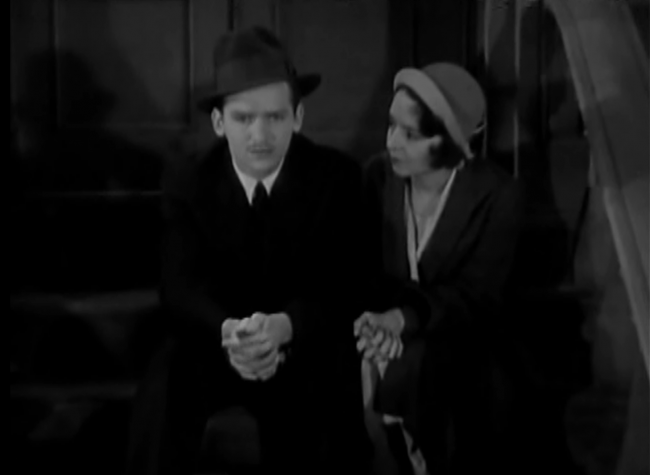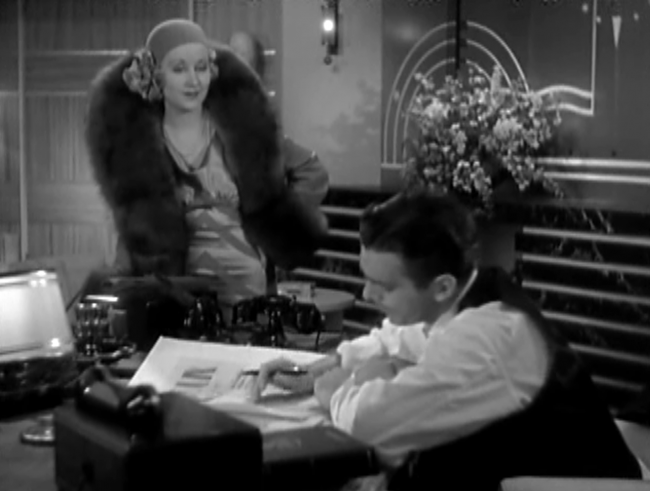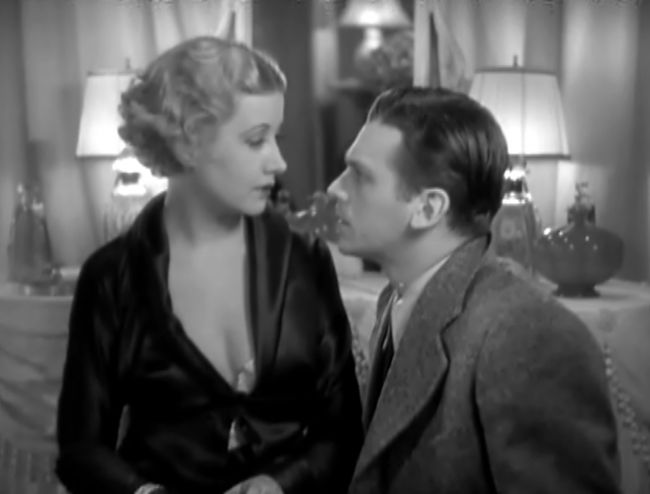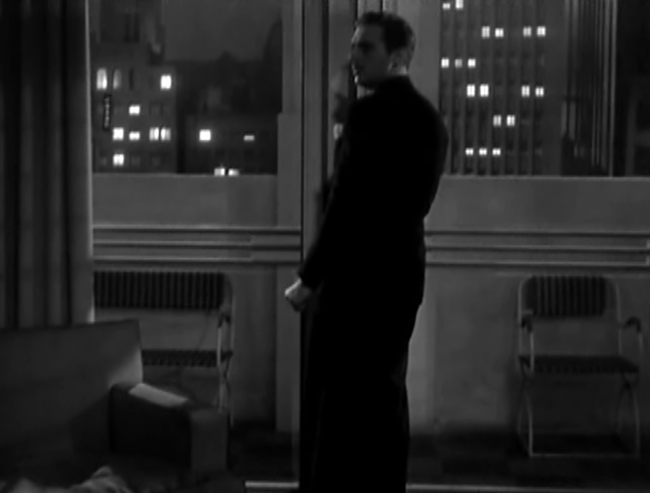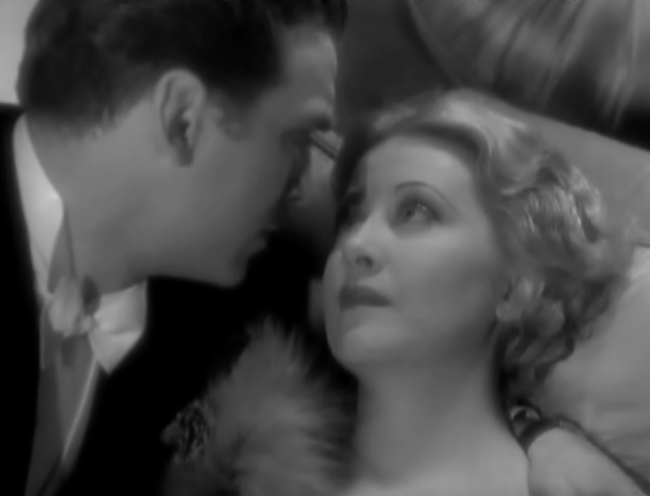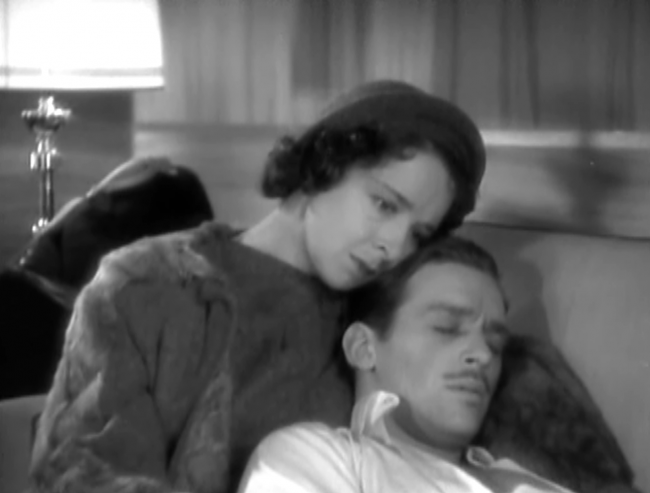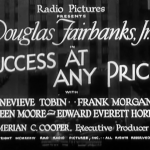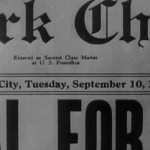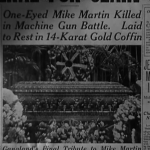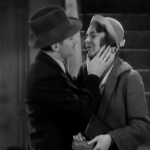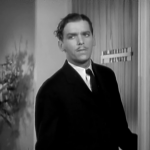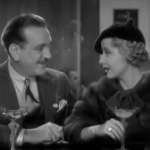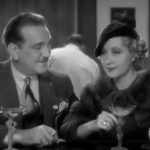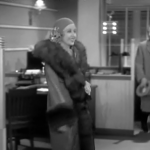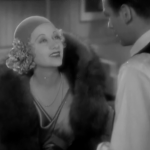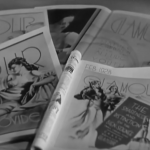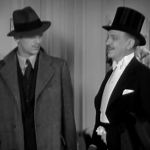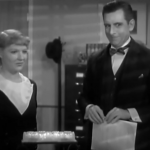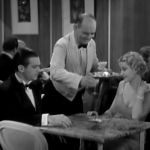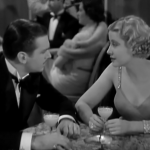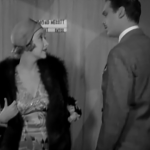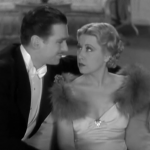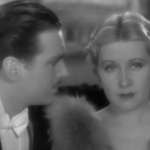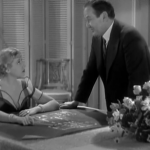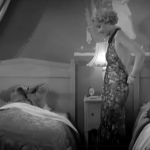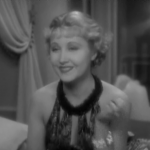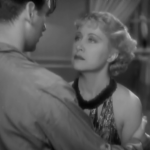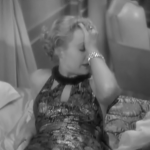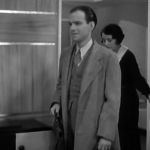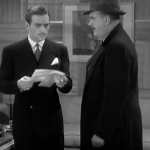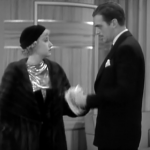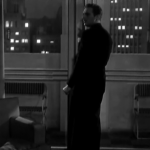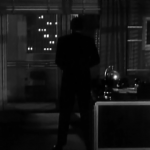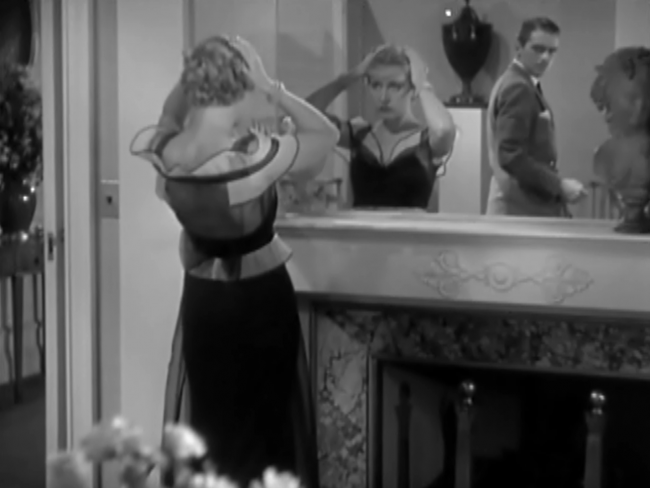 |
 |
 |
| Joe Douglas Fairbanks Jr. |
Agnes Genevieve Tobin |
Sarah Colleen Moore |
 |
 |
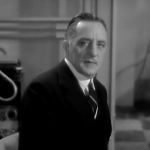 |
| Mr. Fisher Edward Everett Horton |
Mr. Merritt Frank Morgan |
Mr. Hatfield Henry Kolker |
| Released by RKO | Directed by J. Walter Ruben Run time: 74 minutes |
||
Proof That It’s a Pre-Code-ish Film
- All that a college degree gets you is, “Sitting around offices and telling dirty stories.”
- “I can’t help but be sorry that you’re a good woman as well as a good secretary!”
- Tobin is a rather blatant and up front gold digger.
- “It isn’t her eyes, baby.”
- “Frankly, I don’t get this stuff about ethics!”
- “I try to be good, but what’s the use?!”
Success at Any Price: Climbing Over Your Own Corpse
“Just a lot of dreams that turned into nightmares before I could touch them.”
The day after he’s buried his brother, Joe sits on the stairs of his girlfriend’s east side apartment building. His brother had been a gangster, snuffed out by rivals and buried in a coffin made of gold and silver. “The gold and silver I’m after won’t be sitting on my coffin,” Joe vows to Sarah. He’s going to make it big, but he’ll do it legitimately.
Colleen Moore, who was one of the biggest box office draws in the world in 1927 and here appears in her second-to-last film, is Sarah, who earnestly loves Joe despite the fact that he’s a heel 99% of the time. She understands his yearning for wealth and glory and sees that as his better nature simply trying to shine through– she understands why he wants success. She vastly underestimates his ruthlessness though.
That nagging anger festers in Joe, as does his inferiority complex. He begins to work with Sarah at her marketing firm. She’s a forthright, immensely helpful secretary; he’s a belligerent jerk who snivels about the college boys that surround him while making nasty comments about the boss, Mr. Merritt (Morgan), whenever he feels fit. He gets fired, but Sarah goes to bat for him: he has a few critical hours to revise some vital ad copy for the boss.
During this high pressure situation, his boss’ mistress walks in. That’s Agnes, or ‘Aggy’ to sex it up a bit. She’d just been complaining to Merritt about how she wanted money but wouldn’t mind a little passion on top. Merritt chuckled at her dismissively. Entering her staid lovers office, she instead finds an angry, snapping young man who can’t stop sniffing her perfume-scented handkerchief. The two banter, prowling around one another with fangs out.
Joe: “That lavender water sure gets my nanny.”
Agnes: “Take a good whiff.”
“What do you call it?”
“D’amour.”
“Do you use it all over you?”
“Well, not exactly. I use other things.”
“I can just see you in a hot bath with this a’mour stuff.”
“Oh, that’s indecent.”
“Yeah, I heard worse.”
“Tell me worse.”
The beauty of this scene– and the reason why it stands out in the movie since there’s really nothing else like it– is the way the two actors size each other up. There’s an immediate flair of dislike as the two see each other for what they are. They both prize success, but they have vastly different means and goals. It’s their ambitions they see in one another, and it’s intoxicating. Agnes sniffs, “I could teach you a few things. And, if I wanted to, I could make you jump through hoops.” Not to be outdone, Joe sneers, “If I had a million dollars, I’d buy you.”
The disaster comes when their desires intersect. Joe puts that million dollars at the forefront of his life, makes it big at the firm and even manipulates the company stock to oust Mr. Merritt from his job. By deposing him, he inherits his mistress, eagerly dumping Sarah to run Aggy to the altar. But Joe finds no happiness there, nor anywhere else in his business empire as the pursuit of wealth by any means turns him paranoid and catty.
Success at Any Price angrily tears back at the tapestry of problems in capitalism, an unsurprising indictment in the midst of the Depression. Merritt, for all his respectable flaws including a mistress and lust for secretaries, runs a tight business and gives people a second chance. He feels patriotic in investing in the stock market even as things are looking catastrophic, and fights to keep employees. Joe, on the other hand, eagerly exploits every loophole– there’s no bottom to his depravity. He hurts everyone around him for the sake of his pocketbook. As he cries angrily, “There are no ethics in this town. It’s kill or be killed!” He should know.
Punctuated by a dry, witty script, any review of the film you read is sure to be filled with a number of quotes (including, obviously, this one), and almost all will certainly have different ones to choose from. It really helps make the stark morality play at the center more palatable, especially as Fairbanks’ Joe seems to be anything other than palatable in the slightest.
Spoilers.
There are a couple of nice touches in the finale, like how Joe has become so distanced from real humanity during his quest he seems almost startled to find it still exists in the world in a few brief glimpses. There’s also the bleakness of the ‘almost’ ending, as Joe holds a gun and rants about how he needs Sarah in his life or he’s doomed– and she coldly walks out mid-rant. Joe, once he notices she’s left, shoves the gun in his own chest and fires.
It’s a bleak, shocking moment, but it can’t last– movies couldn’t quite carry that one off for another 20 years. Joe is merely paying for his sins, and he wakes up in Sarah’s arms with a doctor on their way. Poor Joe, can’t even be truly successful at killing himself. It feels a lot like the ending of Counselor-at-Law, but more unearned– throughout the film, there was never a hint of goodness worth redeeming.
But what’s funny about all this is that Joe is merely one monster in the system. He would have and could have gotten away with it if it weren’t for his inherent egotism and inability to cope with his own desires. Agnes did get what she wanted, but he took that away from her, just like he destroyed every other thing, good or bad, that got in his way. The ending isn’t a redemption, it’s a sick joke.
End spoilers.
For all the fun of the script, the film has an almost somnambulistic sense of direction and cinematography. While you can see a little extra money in the decor (oooh, wood paneling), the movie looks nearly identical to a Warner Bros. programmer (even more surprising since this was put out by RKO). This atmosphere isn’t helped by the fact that Fairbanks, Tobin, and Moore were no strangers to the Warner lot. This robs the film of a lot of drama through its run, and it would be hard to believe if the film weren’t in the hands of a more accomplished stylist that it would be more well remembered today.
In spite of that and the goofy ending, there’s much to like here in terms of the performances and the sheer audacity of what Joe does. He becomes an unapologetic stooge for the ills of the world of the 1930s– and he doesn’t look that unfamiliar today, either.
Gallery
Click to enlarge. All of my images are taken by me– please feel free to reuse with credit!
Trivia & Links
Although the film version eliminates Joe’s Jewish identity and imposes a happy ending, it is still one of the most caustic of the Depression-era anti-business stories. For such an unlikable character, Lawson had originally wanted the charismatic Paul Muni. Critics praised young Douglas Fairbanks Jr.’s performance but audiences found Joe Martin cold and unsympathetic. The film was released three months before the enforcement of the Production Code, which in addition to policing on-screen morals, banned content directly critical of the American business system.
- Frank Morgan says of the Fairbanks character admiringly early in the movie, “I liked his nerve!”. Kind of funny since Fairbanks had starred in I Like Your Nerve three years earlier.
- Cliff at Immortal Ephemera likes this movie just about as much as I do, though he found Joe even less sympathetic.
Joe Martin is every much the gangster his brother was, running roughshod over the business world and eventually breaking all the rules for personal advancement. In the end he can only be saved by his writer, but his story stops a little bit short. I suspect we’re supposed to see some of this humanity in Joe that Agnes and, especially, Sarah tell Merritt about, but he’s just too down on everything but himself. The Fisher couple and even Halliburton tease that there’s something more there, but the Joe Martin we see is probably even scarier than his dead gangster brother. Angry and soulless.
“I’m in the dark. The fog,” Joe says, and I suppose Sarah offers him a way out. More’s the pity for her.
- The TCM blog Movie Morlocks waxes poetically about Tobin:
While Tobin’s female vamp was probably the popular image of a glamorous, sexy kept woman during the Depression era, her appearance may look matronly by contemporary standards but give her a few minutes and she begins to bloom before your eyes like an exotic hotflower flower. Not a conventional beauty, Tobin turns on the sultriness through her magnetic personality which balances a shrewd, almost mocking self-awareness with an undisguised delight at manipulating men when she’s in the mood. She also delights in flaunting her expensive clothes and access to her tycoon lover whenever she visits the office and breezes past the female office workers, reminding them of their place in the company hierarchy. She should be a despicable character – and probably would be if played by any other actress. After all, she is vain, selfish, spoiled and refuses to compromise any aspect of her high maintenance lifestyle. Yet Tobin makes her strangely likeable at times such as the scene where Merritt discovers she’s been having an affair with Joe and she candidly reveals her assessment of her new lover: “I think he’s the saddest boy in the world. He’s all twisted and funny. He wants to be a great man and he wants to be sweet.” The reality really hits home after Joe and Agnes tie the knot and Joe’s domestic side emerges as he presents his wife with a blueprint of their future home. Agnes’ response is brutally honest in her usual fashion: “What is this? Grant’s tomb? Am I supposed to raise an old fashioned family? Can’t you see me with a sweet-faced brat on each arm? I like New York. I like noise. I’d die anywhere else.”
Awards, Accolades & Availability
- This film is an (undeservedly) obscure one; I asked Warner Archive about a release over a year ago and they said ‘eventually’. Which can be a mighty long time! I wish you luck in finding it!
More Pre-Code to Explore




